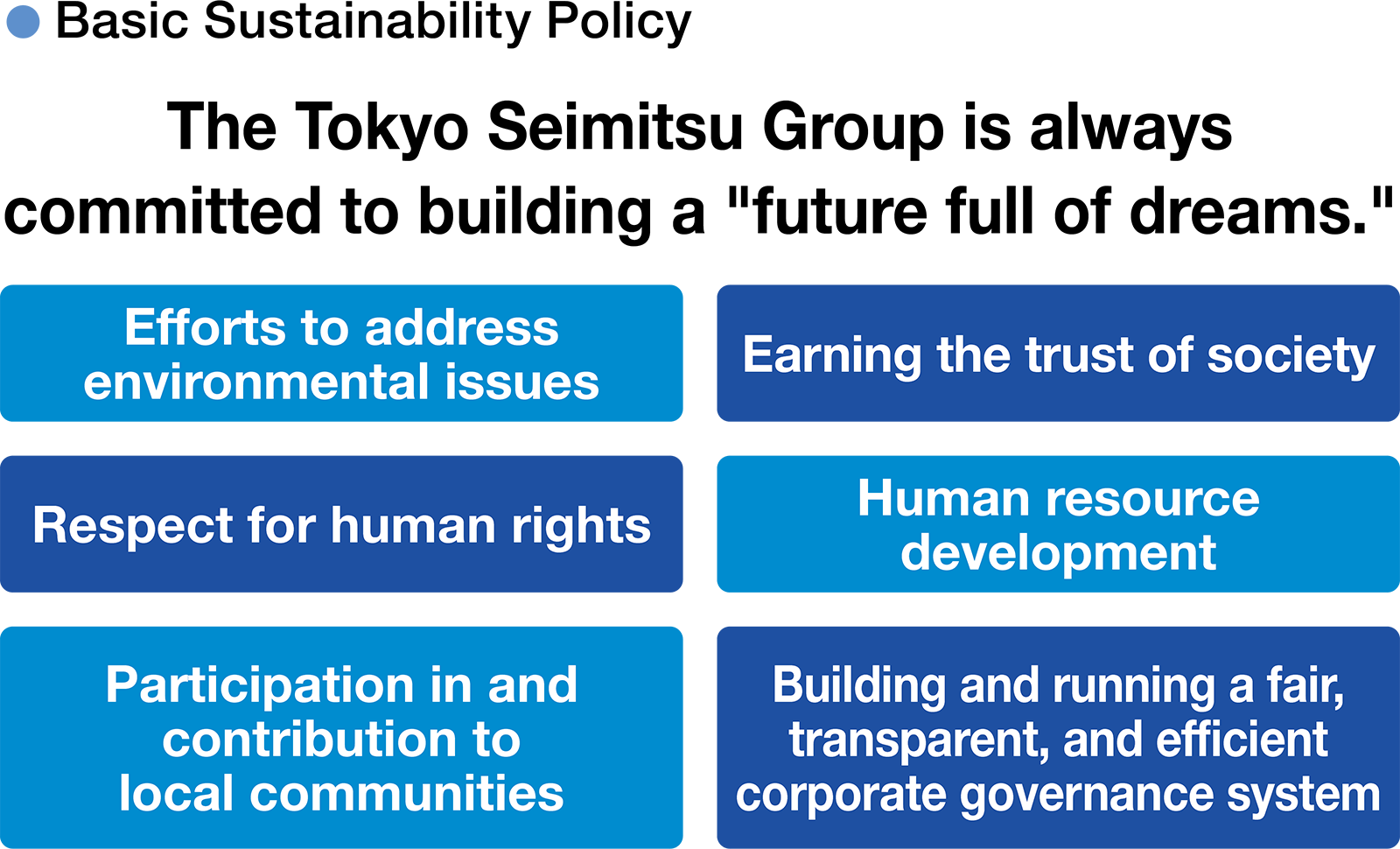
The world is currently facing a number of unprecedented challenges, like climate change and social instability arising from the growing gap between haves and have-nots. I can see first-hand how efforts are being made all over the world to address these issues, including the United Nations and other international organizations issuing recommendations to various industries, and more stringent regulations being enacted by each country. As a member of society, companies like ours need to fulfill our responsibility by keeping pace with these efforts and developing new technologies and products in each respective field.
For around 75 years, the Tokyo Seimitsu Group has grown on the back of semiconductor manufacturing equipment and precision measuring instruments that support the state-of-the-art product development and manufacturing conducted by our client companies, and I want to coordinate efforts with our stakeholders to help create a sustainable society and achieve growth for our companies.
To ensure that the Tokyo Seimitsu Group expands its business and builds up a presence deemed essential to society in the future, I think it will be essential to supply the market with products that have minimal environmental impact and that help people enhance their wellbeing. I also understand that it is extremely important to ensure that stakeholders of the Tokyo Seimitsu Group live a healthy and affluent life, and we are making sure that this forms the very essence of our sustainability activities.
In 2021, we formulated the Basic Sustainability Policy and established the Sustainability Committee, which I chair to spearhead sustainability activities throughout our Group.
The Basic Sustainability Policy covers six key areas: "Efforts to address environmental issues," "Earning the trust of society," "Respect for human rights," "Human resource development," "Participation in and contribution to local communities," and "Building and running a fair, transparent, and efficient corporate governance system," on which we based our materiality issues.

"Efforts to address environmental issues" includes initiatives for contributing to the environment by supplying environmentally friendly products and reducing GHG emissions from our manufacturing sites.
"Earning the trust of society," "Respect for human rights," "Human resource development," and "Participation in and contribution to local communities" focus on solving social issues through the provision of high-value-added products and the establishment of supply chains. At the same time, we have embarked on activities in line with priority initiatives based on materiality issues for creating a workplace where a diverse range of people can play an active role and where they can enjoy a healthy and rewarding work environment, both physically and mentally, and with respect for human rights.
"Building and running a fair, transparent, and efficient corporate governance system" involves strengthening the management foundation, compliance, and risk management that underpins our corporate activities. As the chairman of the Board of Directors, I am also rolling out initiatives to enhance the board’s effectiveness.
Climate change is considered a significant management risk for our Group. In addition to the major impact on the socioeconomic sector that the increase in extreme weather events caused by global warming will have, there are a range of other potential risks, such as rising costs due to more stringent regulations implemented to achieve decarbonization and shrinking target markets due to changes in the markets that our Group targets. In contrast, our products and services also present major growth opportunities toward the realization of a decarbonized society—an example that illustrates this is the way we can contribute to the spread of NEVs.
As such, responding to climate change is viewed as a high-priority challenge, so we are focusing on building a cross-divisional framework to handle this. In 2022, we agreed to the recommendations of the Task Force on Climate-Related Financial Disclosures (TCFD) and are analyzing and disclosing risks and opportunities based on this framework.
We aim to reduce our Group's 2030 Scope 1 and 2 CO2 emissions by 50% compared with fiscal 2018 and are focusing on power-saving efforts with the primary aim of reducing the CO2 equivalent of electricity purchased, as a way of slashing our greenhouse gas emissions.
Currently, overseas markets account for the majority of the Tokyo Seimitsu Group’s sales, and we have approximately 950 employees in 18 countries outside Japan. Regardless of the countries or regions we operate businesses in, the Tokyo Seimitsu Group aspires to be a global company that has common policies and goals that respects the differences in customs and ways of thinking among countries and regions. To this end, we are working to strengthen ties between our employees.
Similarly, we believe that ensuring management discipline throughout the Group is of the utmost importance, so we are enhancing global management toward all of our sites in any country or region where the Group is operating.
The Tokyo Seimitsu Group is implementing our own style of sustainability activities based on our mission of "Growing together with partners and customers by collaborating technology, knowledge, and information to create the world’s No. 1 products." Furthermore, by keeping to our purpose of "Gaging the future with Metrology, Creating the future with Semiconductors," we aim to achieve an affluent society where everything in people's lives advances conveniently, and a sustainable society where we can enjoy the richness of nature and happiness in various ways.
I am delighted to present this Integrated Report 2023, with the hope that it reinforces your understanding of the direction the Tokyo Seimitsu Group is heading, and to grow together with our stakeholders. I would appreciate you taking the time to read through the report and providing us with any feedback you may have.